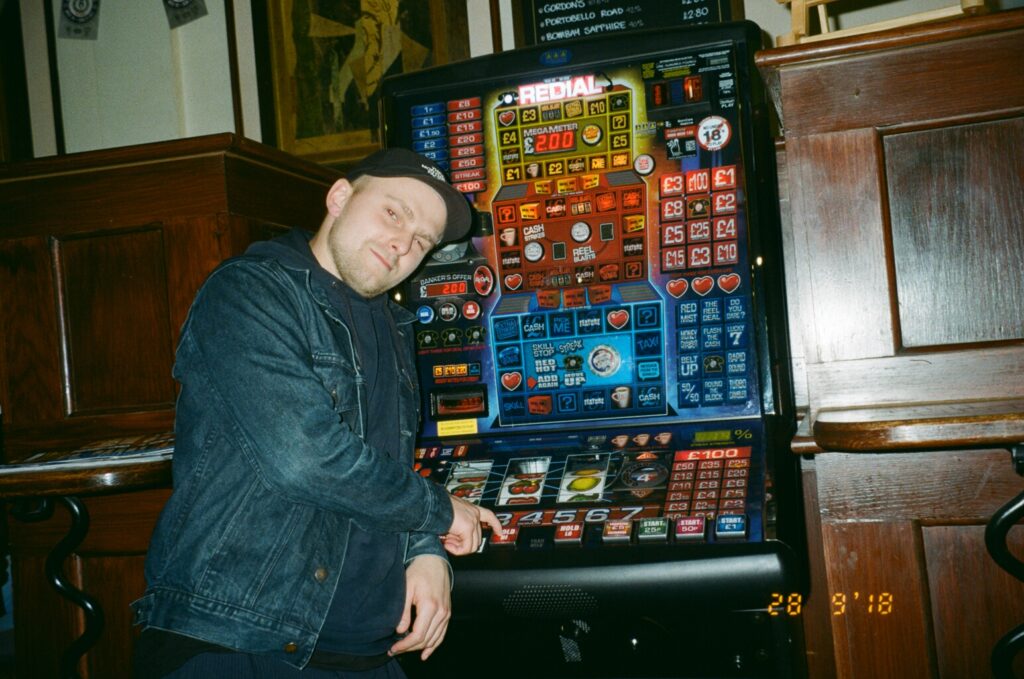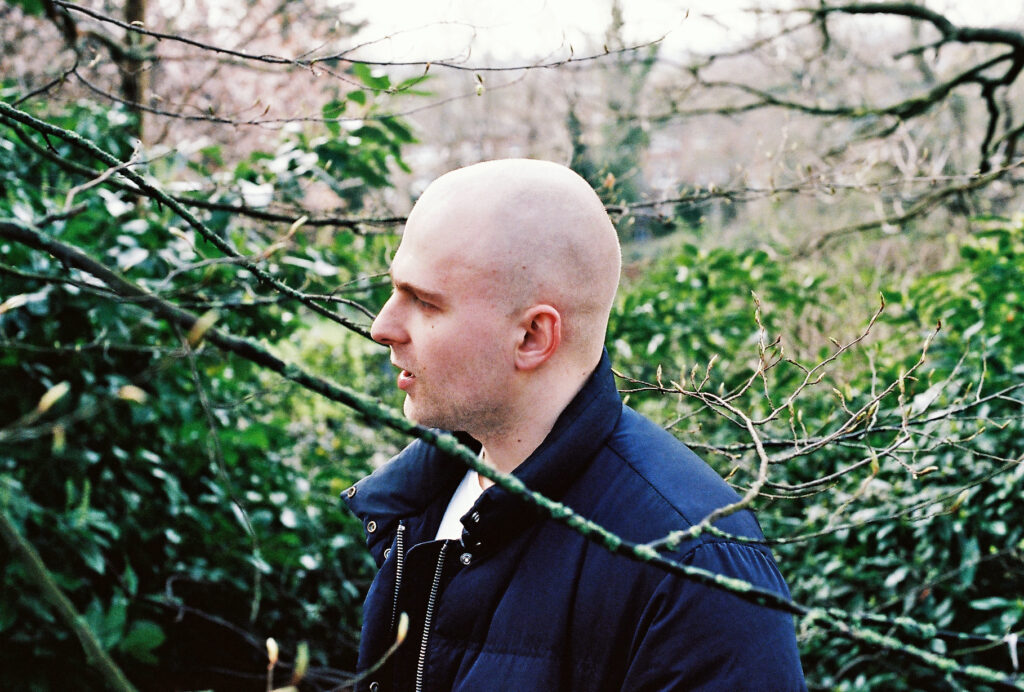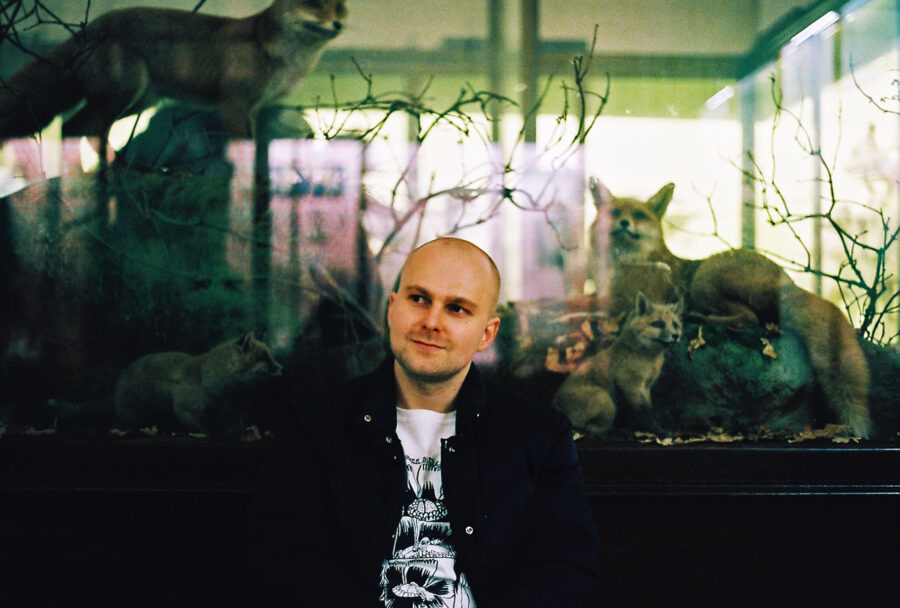Originally starting as a Watford-based party in 2014, London’s Tobago Tracks has seen many incarnations, with its overall universe incorporating a label fitting between the margins of many micro-scenes, a monthly NTS radio show, multimedia outfit, and – back when parties were still a staple of weekend activities – the occasional club excursion. The glue holding it all together and steering the ship through various changes is DJ Pitch, the mind and facilitator behind it all.
Responsible for shining a light on artists such as object blue and Organ Tapes, no one overarching sound defines the wide range of collaborators that the label works with. Rather, an open-minded attitude and a drive to contribute to the wider music ecosystem are behind all of DJ Pitch’s decisions, as shown by the starting of the vital All Centre label in 2018, a label with a broader ambit than TT. Ahead of his debut LP It’s Not What You Said It’s Because You Spoke launching on Edited Arts on July 2nd 2021, we caught up with him to talk about his influences and to discover more behind the mind of one of London’s most consistently cutting edge labels.
What do you see as the major difference between Tobago Tracks and All Centre? What do you look for when looking to sign tracks to each label and how do you decide what gets placed where?
So, I used to run the label with Gribs but she left at the end of last year; the label was very much a reflection of our own tastes, with a broad palette overall. When looking for artists to platform, they’re all very singular, with a distinctive sound that’s uniquely and identifiably theirs. I kinda see our output as fitting between the margins, occupying a space that’s quite hard to find. Gribs and I have previously described the sound as ‘weird music from England’ and I think that sums it up quite well since it uses location as an identifier and covers the broadness of the scope. Ultimately, I’m always just looking to work with and help develop artists who are expressing themselves fully. The album I would’ve loved to have released on the label is ‘Blonde’ by Frank Ocean – the way he deconstructs R&B and mixes it with those icy, atmospheric soundscapes is exactly the kind of genre-melding approach I try to take with the label.
All-Centre’s a bit more focused, aiming for the intersection between techno and ‘club’, drawing inspo from US club styles etc whilst also being experimental. The ‘club’ label can’t really be pinned down and means many things to different people, but things made a lot more sense to me in my head after first hearing object blue’s first release on Tobago Tracks. I’ve been heavily influenced by Night Slugs and Hessle Audio, but hearing the way she used the rap sample on the record was a moment of clarity making me realise that the worlds could be brought together.
You’ve previously said that you want the labels you run to serve as a springboard for others rather than a platform for yourself – what made Edited Arts the right label to release on? What’s your relationship with them?
When starting to put tracks together for the record, I knew I wanted to release on another label since I look at both labels as entities designed to help develop other artists rather than furthering my own output.
I was looking for a label that had a similar spirit and that was doing what I’m doing with the labels but better. When looking for collaborators, I look for people that have the same mindset of experimentation and a desire to push things forward. After I had all the tracks and started thinking about releasing, I reached out and they were very receptive. Working with them has been a really great experience ‘cos they’ve been helpful and fully invested every step of the way.

You’ve previously released on All Centre with the ‘Pbat’ release at the start of 2020, why did you think now was the right time to step out from behind the shadows and unleash an LP into the world? Having previously studied for a classical music degree, when did you make the decision to put yourself out there as a producer?
I’d constantly been putting off chasing this artistic journey for fear of not being able to make a hit. I’d do the classic producer thing of starting tracks but then not finishing them and moving on to different ideas, constantly chasing after the idea of creating a game-changing hit. It wasn’t even a conscious decision per se; I gradually decided to just let go and stop putting that pressure on myself.
Up until now, my taste had been reflected in the artists put out on the label. Looking at the artists who were releasing, I didn’t feel as if I could match their calibre of artistry. I was putting too much pressure on myself to make seismic world-shifting bangers, when that was a standard that was unattainably high. I felt as if I couldn’t live up to what would be expected from someone in my position, even though it was an ideal I’d built up in my mind.
Once I started focusing on developing a specific artistic voice rather than trying to make bangers, I was able to form a routine. After going back through old files and seeing that there was stuff I could work with and flesh out, I was quite disciplined with my time and would spend a few hours every morning chipping away. After a long time of not really having a clear idea of what I was doing ‘as an artist’, it all came together very organically.
Even just a few years ago, the music world seemed to be a lot more discrete and tribalistic. Now, however, the boundaries seem to be well and truly blurred – where do you see the future of things in the next few years?
It’s difficult to say ‘cos covid has made things well and truly unpredictable. The lack of boundaries and the increasing agnosticism towards typical genre classification has made it harder to know what, if any, genre is dominant at the moment. Prior to lockdown, there was a simultaneous resurgence of multiple genres like UKG and jungle and breaks etc and, though genre helps with classification, things are significantly looser these days.
The Internet of course feeds v heavily into this, with the way everything’s so algorithmically based – new sounds are tied heavily into what we engage with and the ingestion of music happens in so many forms that we’ll never be able to fully tell the effect of what’s been going on in terms of formation of tastes. Then you chuck in Gen Z into the mix and the way they TikTok is used to break larger mainstream tracks – we’re quite disconnected from them, so who even knows how that fits into all this??
Following on from that, where do you see your role in all of the above? Through TT and All Centre, you’ve helped incubate up-and-coming talent such as object blue and Alexis and allowed them to breakthrough.
To be honest, I’m still figuring it out. As I said above, last year has shifted the way the music industry works, so it’s hard to tell how this period fits into the wider industry. Bandcamp Fridays have been amazing as they put the artist first and have shifted the balance somewhat; artists tend to rely on gigs, but this has shown that there are initiatives that work in terms of other income streams.
For a long time, I was quite despondent about the future – however, new opportunities come up and things change. I believe that the best way to operate in this industry is to give artists full artistic freedom and to just be there to give a helping hand. I want them to be able to present their vision in an undiluted way and, in my opinion, the best way to do so is to operate without restrictions.
When running a platform designed to uplift others, it’s very easy to let yourself take a backseat, even when you have a distinct vision for yourself that you want to shine through. How do you balance the push-and-pull between these two tensions?
I didn’t really balance the two for a long time to be honest. I’d put myself in the background and was happy to help facilitate other people’s creativity; this was kinda my way of letting my vision shine through. After a long time putting it off, I made the decision to make a push for myself but it wasn’t necessarily even a conscious decision – I just felt as if I had to for my own sake.
There’ve been points throughout the journey where I’ve sometimes felt disconnected from the wider purpose of what I’ve been doing and almost going through the motions. I think it’s quite easy for that to be the case when you take on a background role, but I’ve definitely come full circle and reignited the passion. At the end of day, I have a deep emotional connection to music and I’m excited by good music; finding myself in a position where I can break new music and find new music is quite exciting. A lot of work, but definitely exciting.

What are some of your musical inspirations? You have a distinctive production style that feels very much in keeping with the amorphous nature of the ‘bass’ genre whilst clearly drawing from a wide range of creative influences.
As to be expected from both labels’ output, they’re very broad. When first getting into electronic music, I religiously devoured all of Night Slugs’ output and would listen to the Hessle Rinse show all the time, so I’m heavily inspired by the lineage of bass music in the UK. Also, music that’s quite lush, harmonically rich and jazzy in chord structure which is why I’m drawn to jungle.
Funnily enough, I used to be an indie kid and looked down on electronic music in quite a snobby way. I associated it purely with going out to get wrecked and going on the pull, dancing to quite bad cheesy music – I didn’t take it seriously and certainly couldn’t see it as an art form. It was only after going out to proper venues and taking in the full experience that my eyes were opened. It was almost overwhelming in how eye-opening it was, like a completely new world.
After that, I went deep into an electronic music wormhole and rejected a lot of the stuff I was initially into, like Beach House, Bjork, Animal Collective but eventually came back round by realising that they were quite formative influences. I basically ended up coming round full circle and drawing from inspirations that had been there all along.
One of the great things about the LP is how it has a cohesiveness to it despite covering a range of styles and moods – was there a specific feeling/concept you were trying to convey?
Wooziness and lack of clarity. Lots of reverb, delay and echo. Lush, rich and atmospheric. I didn’t consciously think about it but came out like that – I’m sure if I sat down and thought about it, I could trace a line through all my influences. Ultimately, what I was going for was having tracks that you could dance to and that would work in a club setting but also having tracks that build upon the overall mood in between.
Compositional skills have been pretty hardwired into me through my classical degree so I’m always looking to push that aspect forward and to keep things interesting in that sense.
What keeps you motivated?
For a long time, it was that since I was doing this really cool thing, people would pick up on it and I’d become this huge superstar. Ego was a huge motivation. Now I’ve come back to it being purely about the music and I’m grateful I can use my position to help other artists break through and express their most authentic selves.
The nature of music means it can be quite focused on ego-stroking so, even though I’m fully immersed in it, I’m glad I have another outlet in the form of studying architecture which I’ve been doing for the past few years now. It allows me to focus on something else and takes me outside of myself.
After a long time of not really knowing where I was going with music-making, I’m glad I can say that, with the album, it was ultimately made for myself and I’m super into it. At the end of the day, nobody can take that away from me.
Finally, with life returning to some semblance of normality, what are you looking forward to?
Getting back to the clubs (ofc), travelling, seeing friends for the first time in a while. I sadly lost a family member to covid, so I’ve been particularly cautious with not seeing people, but it feels good getting back into the swing of things. Things can only go up from here.
‘It’s Not What You Said It’s Because You Spoke’ by DJ Pitch will be released via Edited Arts on the 2nd July – pre-order here.
